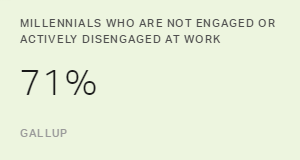Story Highlights
- Companies should not accept job-hopping as the new norm
- It is within leaders' power to keep millennials around
- Engaged millennials are far less likely to consider leaving
If millennials are job-hoppers, it's with good reason.
Seventy-one percent of employees in the millennial generation (people born between 1980 and 1996) are either not engaged or actively disengaged at work, according to Gallup's report How Millennials Want to Work and Live.
Here are some findings that reflect millennials' lack of loyalty in the workplace:
- 21% of millennial workers report changing jobs within the past year
- six in 10 millennials are open to different job opportunities right now
- only half (50%) of millennials plan to be with their company one year from now
- one in two millennials say they would consider taking a job with a different company for a raise of 20% or less
This trend is troublesome for leaders because these workers currently make up 38% of the U.S. workforce. Some estimate that they will make up as much as 75% of it by 2025.
The High Cost of Turnover
Some react to the millennial job-hopping reality by suggesting that employers should view the change as a problem but should also accept that the workplace is becoming more fluid and consider the evolution an opportunity. Others have even suggested we need to encourage it, stating that job-hopping is an important part of the employee life cycle, particularly at the beginning of the employee journey.
The problem is that job-hopping can cost organizations a lot of money when top talent goes walking out the door.
The replacement cost of an employee can be 150% of his or her annual salary or more -- for example, as much as $150,000 or more for a worker with an annual salary of $100,000. And Gallup estimates show that millennial turnover as a result of poor employee engagement costs the U.S. economy $30.5 billion a year. Employers are making a costly mistake if they write the job-hopping tendency off as unchangeable or out of their control.
Not All Millennials Bounce From Company to Company
Here's the key caveat to the job-hopping story: Not all millennials bounce from company to company. Millennials who are engaged at work are 26% less likely than millennials who aren't engaged to say they would consider taking a job with a different company for a raise of 20% or less. Engaged millennials are also 64% less likely to say they will switch jobs if the job market improves in the next 12 months compared with millennials who are actively disengaged who say the same.
While there is some truth to the notion that millennials as a whole tend to be job-hoppers, a closer examination of the data shows that engagement is at the root of the issue. It's the 71% of millennials who are not engaged or actively disengaged -- unfortunately the vast majority of the generation -- who give their fellow millennials the job-hopper reputation. Millennials who are engaged at work demonstrate considerably greater loyalty to their employers.
For leaders, these findings point to the need for action. To protect their human capital investment, organizations need to do something about the 93% of millennials who say the last time they changed roles they left their employer to do so.
What Employers Can Do
First, leaders need to better understand the problem. They need to determine what needs are unmet among disengaged millennials that make them more likely to leave than fully engaged millennials.
One problem is that some millennials do not feel as comfortable approaching their managers with concerns such as asking to learn more, seeking higher pay or requesting more responsibilities. To some millennials, worries about being perceived as disloyal or as a "flight risk" can preclude them from initiating important development and coaching conversations. Considering that ongoing development is a fundamental job expectation and top retention factor for millennials, trepidation among these workers about talking with their managers is a serious problem for employers.
If managers don't proactively initiate and continually welcome development conversations, their millennial employees might explore other opportunities -- an easy task in an age when job seekers are always digitally connected and aware of their options. By failing to actively meet millennials' need to learn and grow, managers are likely to get hit with letters of resignation before they even knew there was a problem.
Managers and leaders need to get ahead of the issue by understanding millennials' basic workplace needs and making it a priority to fulfill them. From the start, managers could use frequent coaching conversations to discover each millennial employee's interests to better provide ongoing opportunities to learn new skills.
Managers also need to convey that they care about millennials' long-term plans. It is managers' responsibility to ensure that millennials understand their future in the company and communicate that workers don't have to go somewhere else to advance. Assuming that millennials can visualize the potential for advancement -- or grow on their own -- is a big mistake.



